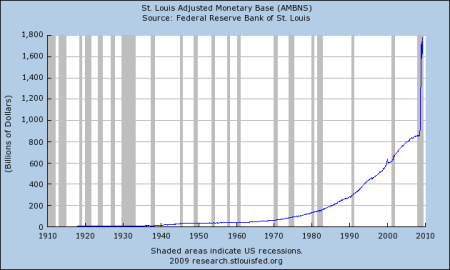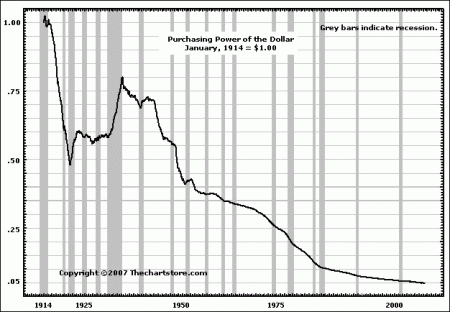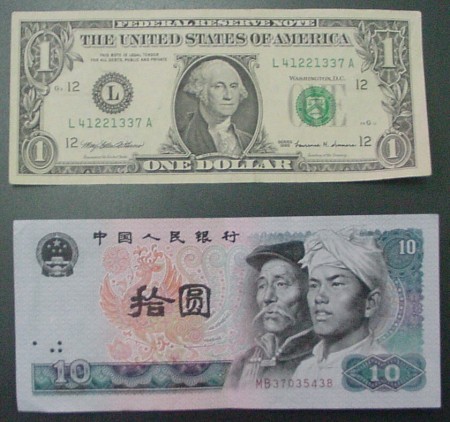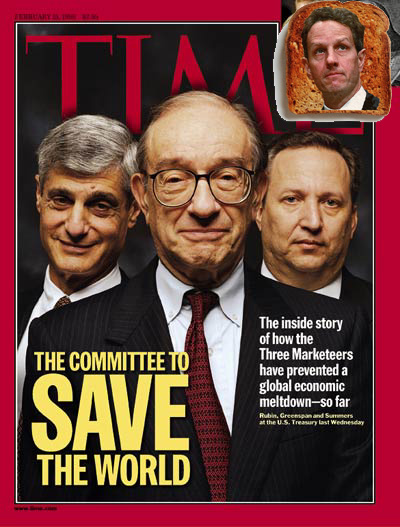Back to Boring for The Fed?
Congressman Ron Paul writes from his weekly “Texas Straight Talk” column that he is “very pleased with the progress of HR 1207, which calls for a complete audit of the Federal Reserve and removes many significant barriers towards transparency of our monetary system. This bill now has nearly 170 cosponsors, with support from both Republicans and Democrats. Senator Bernie Sanders has introduced a companion bill in the Senate S 604, which will hopefully begin to gain momentum as well. I am very encouraged to see so many of my colleagues in Congress stand with me for greater transparency in government.”
Judging by a May 13, Forbes article by Thomas F. Cooley, “The Federal Reserve Needs To Be Boring Again”, it appears that all this talk of audits may be starting to make the boys and girls at the Fed just a tad nervous. According to Cooley “The financial crisis forced the Fed to be aggressive and creative in its attempts to provide liquidity to credit markets that had frozen up. These were necessary steps, and mostly applauded. ” Cooley worries that the selfless display of “boldness of its actions has put the independence of the Fed at risk. Congress is now clamoring to audit the Fed, and some of the policy proposals currently under discussion at the Federal Reserve will only increase the threat to its independence.”
Why is “an independent central bank so important?” “The answer”, according to Mr. Cooley, “is quite obvious. An independent central bank can focus on monetary policies for the long term–that is, policies targeting low and stable inflation and a monetary climate that promotes long-term economic growth. Without independence, the political cycle would subject the central bank to political pressures that, in turn, would impart an inflationary bias to monetary policy.” With all due respect Mr. Cooley, as a student of human nature, I’m pretty sure that the dispatching of over nine trillion dollars of taxpayer money, by a handful of bankers to a handful of their friends and business associates leaves the realm of “independence” and enters into a singularity as the Greatest Crime and Fraud ever perpetrated in the history of man. Now if that’s libelous, well… sue me. Open the Feds books, prove me wrong and sue me.
At any rate Mr. Cooley opines Federal Reserve Bank independence is important so the financial wizards can stay focused “on monetary policies for the long term… policies targeting low and stable inflation and a monetary climate that promotes long-term economic growth.”
In his essay “Inflation: An Unworkable Fiscal Policy” Ludwig von Mises defines inflation as “increasing the quantity of money”:
“Inflation, as this term was always used everywhere and especially in this country, means increasing the quantity of money and bank notes in circulation and the quantity of bank deposits subject to check. But people today use the term `inflation’ to refer to the phenomenon that is an inevitable consequence of inflation, that is the tendency of all prices and wage rates to rise. Those who pretend to fight inflation are in fact only fighting what is the inevitable consequence of inflation, rising prices. They try to keep prices low while firmly committed to a policy of increasing the quantity of money that must necessarily make them soar. As long as this terminological confusion is not entirely wiped out, there cannot be any question of stopping inflation.”
So if Fed independence is important because the central bank needs to “focus on policies for the long term, policies like low and stable inflation”, how successful has the the Fed been in achieving its goals?
This is the Money Supply Growth Since 1913.

The giant spike up on the far right is the bailout. It shows the the Monetary Base exploding from just over $800 billion dollars in August 2008 to over $1.6 trillion dollars by March of 2009.
This is the effect the Money Supply Growth has had on the purchasing power of your dollar!

The reality is that under the Federal Reserve’s “independent”, watchful eye, with its “policies of low and stable inflation” ,the dollar has lost over 95 percent of its value!!
In his 1543 booklet, “The Principles of A sound Currency”, Nicholas Copernicus wrote ” From this cause comes the continued complaint which echoes and re-echoes on every side that the price of gold and silver, the price of corn, food prices, and the wages of labor, indeed, the prices of everything that makes up the daily cost of living are always rising.”
“Our negligence prevents us from seeing that the increasing dearness of everything comes from the depreciation of the currency. As a matter of fact, prices of commodities increase and decrease proportionately to the quantity of money.”
This is why the issue of Sound Currency is so important. If we had lived under a sound currency monetary system since 1913, a dollar earned and saved in 1913 would still be worth a dollar plus whatever growth could have been earned. You wouldn’t have to continually monitor your “investments” to see if they were “keeping up with inflation”. You wouldn’t have to count on the “appreciating value” of your home to act as a store of value to see you through your golden years.
This is why folks living on fixed incomes are so devastated by the Feds inflationary monetary policy. The problem isn’t that their incomes are fixed. The problem is the monetary system is broken.
Under the policies of the “Independent” Federal Reserve System your wealth has been stolen just as sure as if a robber went to your bank and took it from your savings account.
—————————————————————————————————————————-
Now, the ever eloquent Dr. Ron Paul needs no defense from me, but I can’t help respond to a derisive comment in the Forbes article by Mr. Cooley. He wrote “But now they want to assert control over the Fed. Bills H.R.1207 and S.604, introduced, respectively, by Rep. Ron Paul and Sen. Bernie Sanders, would assert greater control over the Fed. As Ron Paul writes on his Web site: “Auditing the Fed is only the first step towards exposing this antiquated insider-run creature to the powerful forces of free-market competition. Once there are viable alternatives to the monopolistic fiat dollar, the Federal Reserve will have to become honest and transparent if it wants to remain in business.”
Mr. Cooley continues:“Great! Obviously, monetary policy is so falling-off-a-log simple that your elected representatives can insert themselves via the demand for transparency into decisions of true complexity and subtlety. Why am I not feeling reassured?”
No Mr. Cooley we don’t think “monetary policy is so falling-off-a-log simple”. Quite the contrary. We think monetary policy is even infinitely more complicated than say, manufacturing a pencil. We’re absolutely certain that it is far too complicated to leave to a bunch of Yale and Princeton economists and an “independent” Federal Reserve Bank, working from failed Keynesian monetary theories.
We believe it is best left to the powerful forces of free market competition.
Audit the Fed, Then End It!
– Doug R 05/21/2009



 Posted by DougR
Posted by DougR 





